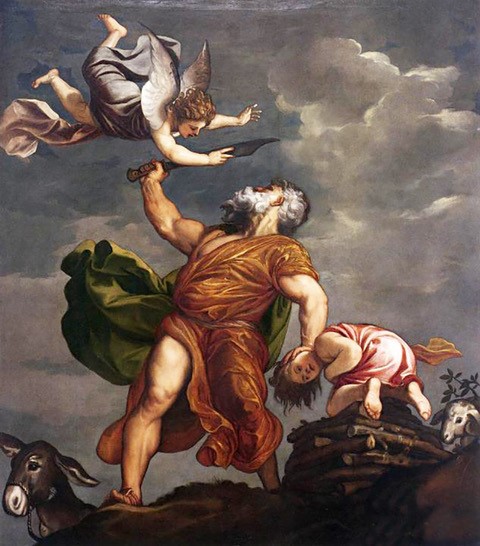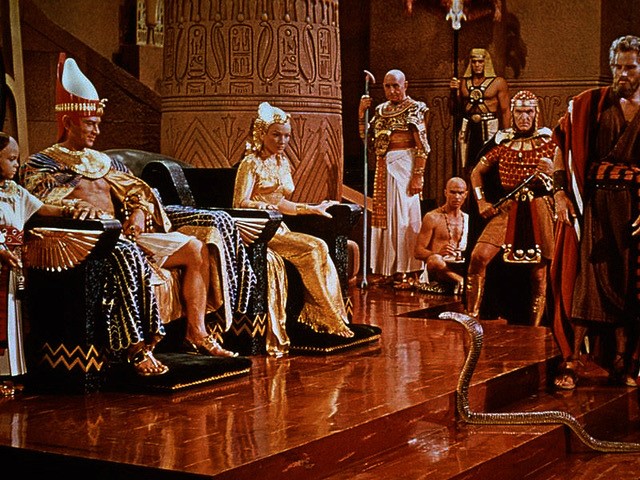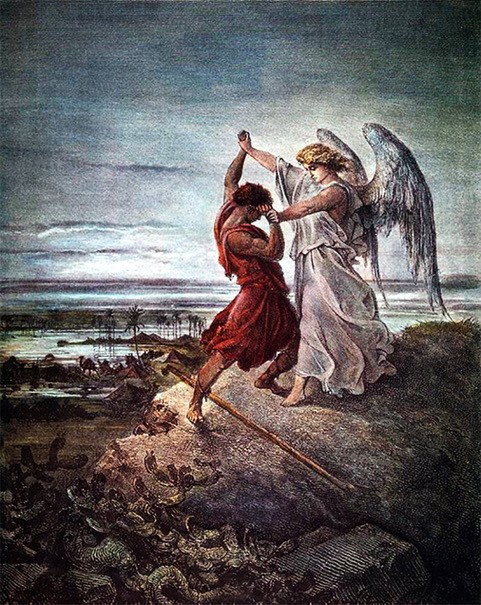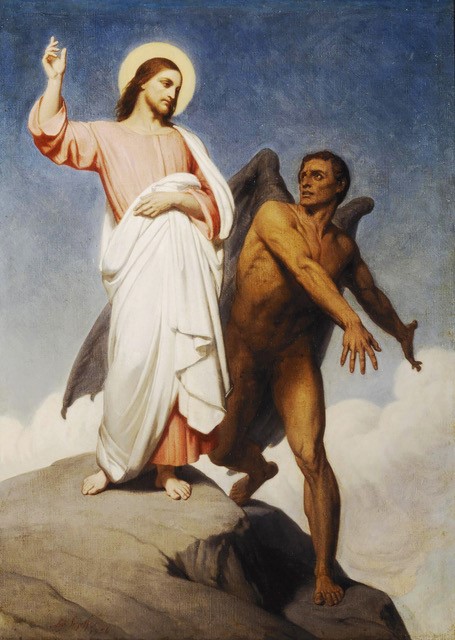Sermon for the Fifth Sunday in Lent: March 21, 2021 jj
Rev’d Mark B. Stirdivant, Good Shepherd Lutheran Church, Yucaipa, California
✝ sdg ✝

The testing of Abraham lasts a total of three days. It’s not only the moment God spoke to Him, but it includes all that time he journeys through the wilderness with Isaac, his only son with his beloved Sarah. This is the miracle child, born when both parents were in their nineties after decades of failing to conceive. Isaac’s name means “he laughs,” and he is their laughter in their old age. But even more than that, he’s the child of the promise: the Lord has declared that through Isaac, Abraham will be the father of a great nation.
All of that seems in jeopardy now, endangered by God’s own command. “Take your son, your only son Isaac, whom you love, and go to the land of Moriah, and offer him there as a burnt offering on one of the mountains of which I shall tell you.” What? Kill the son who gives you laughter as a sacrifice to Me, says God. There’s no explanation why, no good reason given. Just the command to obey.
So Abraham journeys with servants and Isaac, with wood and flint. Abraham could have heard the same devil’s voice that dates back to Adam and Eve. Did God really say that? Why would He prevent you from what you want? Is God just? Is He even stable? God promised that a great nation would come through Isaac, so wouldn’t you be helping out God in His plans if you ignored this one command and kept your son alive? Can’t this test be taken some other way? And in amongst the anxious questions and the second-guessing, the boy poses a question too: “Behold, the fire and the wood are ready, but where is the lamb for a burnt offering?” One can only imagine how heavy is the silence that followed that question before Abraham responds, “God will provide for Himself the lamb for a burnt offering, my son.”
The basic test here is this: will Abraham make Isaac into an idol? Will he fear the loss more than he fears disobeying God? Will he love his son more than he loves God? Will he trust his instincts and emotions more than God’s Word and promises? After all, God’s promises seem impossible now: as Hebrews 11 notes, the only way at this point that God can keep His promise is if He raises Isaac from the dead. And how likely is a resurrection from the dead?
The three days of trial have come to this, and Abraham finds himself standing over Isaac, his knife poised to slaughter the son that gave him laughter. It is only then that the Lord intervenes. He says, “Abraham! Do not lay your hand on the boy or do anything to him, for now I know that you fear God, seeing you have not withheld your son, your only son, from me.” Along with the words to deliver, God provides a ram, its horns caught in a thicket. It becomes the sacrifice. Isaac lives. God has provided a lamb, and all His promises about a great nation and a Savior through Abraham and Isaac will be kept.
What do you learn from this? Is it, “As long as you have faith like Abraham—as long as you’re willing to give up everything in service to God (especially the things most precious to you!), only then can you expect God to reward you and do great things through you.” No, the faith that Abraham has is a gift from God. It’s not his own doing. Abraham doesn’t earn God’s favor by fervently believing in Him: Abraham only has faith because God favors him. The testing of Abraham is about what God has done so that your faith might be strengthened; for while it is easy for us to focus upon what Abraham endures and does, it is also easy to neglect what God is doing. He may appear cruel as He commands Abraham to sacrifice Isaac, but faith clings to this: God provides a lamb. Not just the ram that day on the mountain; God provides the Lamb of God who takes away the sins of the world. In this important turn of events, the Lord declares to Abraham, “I will spare your only son of the promise. But I will not spare My own Beloved Son to keep My promise of salvation.” Not only for Abraham, but also for you: God provides your lamb of sacrifice as well.
How do you make out when testing and temptation come your way? Some temptations are worse than others, and far more painful. There is a temptation you share with Abraham, one that destroys the faith of many. It is the temptation to make idols out of those you most love. This is a strong and terrible temptation, and it’s a time when God doesn’t seem loving or fair. People start saying things like: I don’t want a God that allows me to suffer like that!
An idol or a false god, we are taught in the Catechism, is something that you fear, love or trust in more than God. It makes sense, then, that the things you hold most precious are the things you are most likely to love more than God. And if that is true of things, it is certainly true of people: apart from yourself, the people you most love are the most likely idols you have. After all, you can see them, touch them, interact with them: they seem far more real to you than God whom you only know by faith. So loved ones become idols. It happens when you’re willing to sin to please friends, fiancée, spouse, kids: this means that you fear offending them more than offending God.
It happens when parents say, “I’ve always said that this activity is sin, but now that my kids are doing it, I have to say that it doesn’t seem so wrong. I have to still love them, right?” Thus you make them your idol because you’ve decided that their doctrine and practice is true, and therefore God is not true anymore.
It happens when someone says, “I am so attracted to this person that I want to be with them intimately, even if God’s Word expressly forbids it.” That is to say, “I love this person and my relationship with them more than I love God and my relationship to Him.” That’s a seductive idol indeed. It happens in courtship: when girlfriends and boyfriends tempt Christians away from the faith, they become idols who say in effect, “Who do you love more? Me or God?”
And it also happens, very painfully, in a solid marriage and family when a loved one is stricken with disease, seriously injured or even taken in death. That puts you in Abraham’s shoes on the way to Mt. Moriah: “What sort of a God would let this happen? Why is this His will? Why should I follow Him if this sort of thing happens?” Those are awful times of testing, and the devil doesn’t play fair: and he will use them as tempting idols for you, to make you fear the loneliness more than you trust in God’s promises, to make you hate God in your grief for those whom you no longer see.
It can be too easy to explain your sins away, to offend God rather than deprive yourself, to accuse God of unnecessary cruelty to you when you are given to suffer affliction. You make yourself an idol every day. We all do. These temptations are especially fearful because they are so severe, so easy to fall prey to, and because they will almost certainly happen along the way. You want a strong faith that clings to Christ long before such temptations seek to tear you away. It’s why you discipline yourself to make the Word and the Supper a priority continually, not just occasionally. It’s why you take care to teach the Word to your children: why you speak the Law in love and shower them with the Gospel’s forgiveness. It’s why you share it with your spouse and friends; so that, when it is given to you to grieve loss, you might still rejoice in the promise of God’s resurrection. That’s what you do in Lent, and all your life: you confess your sins and you look to Christ.
The Lord made promises to Abraham, He has also made promises to you. As the Lord kept His promises to Abraham, so He keeps His promises to you. Long before his son Isaac came along, God called Abraham and made him His own: He promised Abraham a land and that he would be the father of a great nation. What did Abraham do to deserve this? Nothing: it was all God’s doing. Long before today, the Lord redeemed you from sin: well before you were born, like Isaac carrying the wood up the hill, Christ carried the cross to be the sacrificial Lamb for your sin. In your baptism, God said, “I choose you to be My child.” And what did you do to deserve that? Nothing: it was all God’s doing. That’s Good News: you don’t ever have to wonder if you did enough to earn your baptism. Jesus earned it for you by His life, death and resurrection.
The Lord has made you His at the cost of His own sacrificed blood, and He has promised His faithfulness to you. Between that price and that promise, you are assured that the Lord works all things for your good and the good of His people. He works all things for your good, even when it seems that He does not. You know this by faith, not by sight. This is a world of trouble—to pretend otherwise is to deny the Word of God. But within this world and its trouble, you have the Lord’s promise that you are redeemed. You have the promise of forgiveness, no matter what sins you have fallen prey to. You have His assurance of the resurrection of the dead.
There will be times when you must walk as Abraham did for those three awful days, trusting and obedient to God’s Word even when it seems to make no sense at all. But you know that the Lord is with you. You know that He will deliver you. You know this because you know that God did not spare His own Son, but gave Him up at the cross for your redemption. He is the Lamb whom God provides to save, who took your place for the punishment that was yours; and for His sake you are forgiven all of your sins.
In the Name of the Father and of the ✝ Son and of the Holy Spirit.

Readings:
Gen. 22:1–14 where is the lamb for a burnt offering?
Psalm 43 Why are you cast down, O my soul?
Heb. 9:11–15 Not with the blood of goats and calves
John 8:42–59 before Abraham was, I AM.



